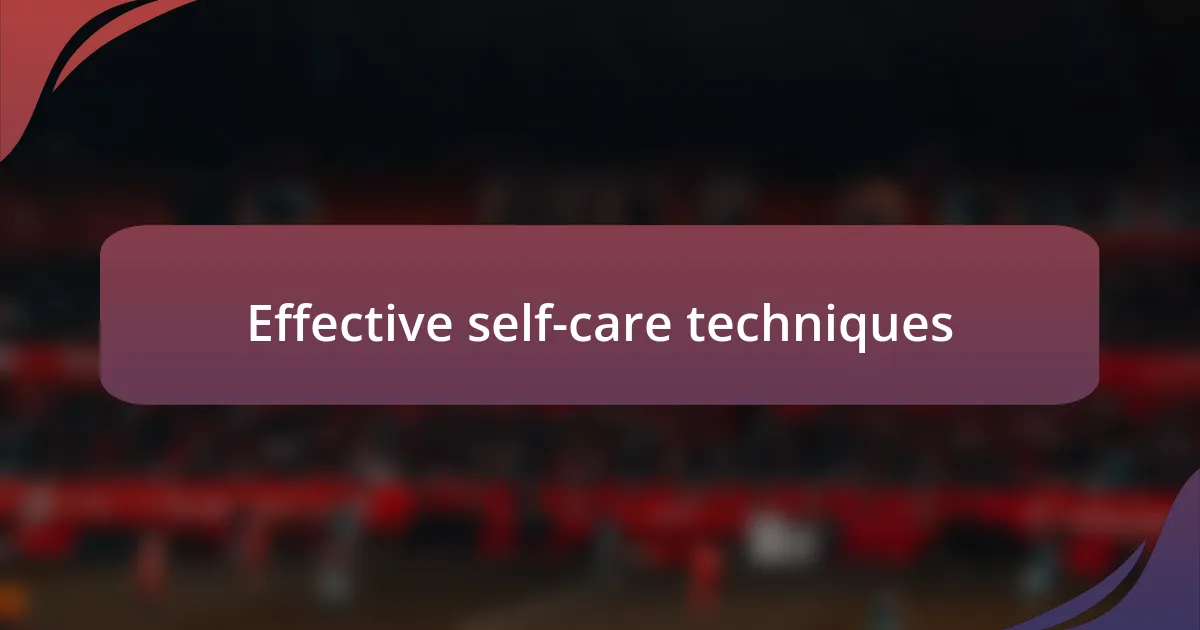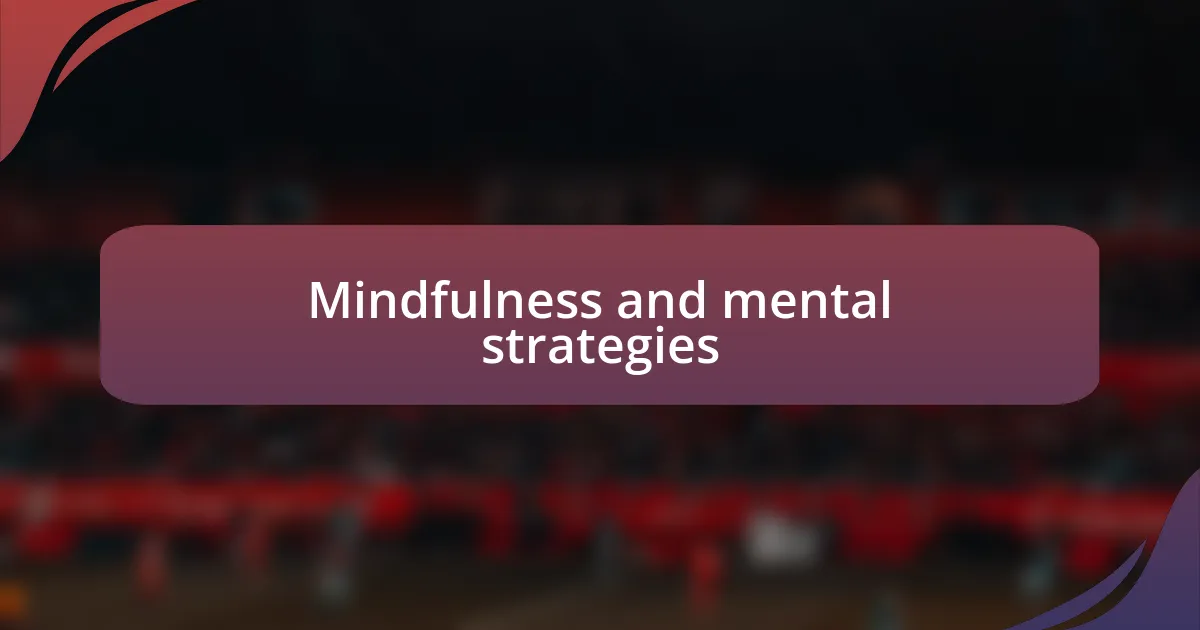Key takeaways:
- Heavy days can arise from various factors, including stress, fatigue, and hormonal changes, impacting both mental and emotional states.
- Recognizing symptoms such as persistent fatigue and irritability is essential for managing heavy days effectively.
- Effective self-care techniques include mindfulness practices, physical movement, and connecting with supportive friends.
- Seeking professional support, such as therapy or support groups, can provide relief and foster a sense of community during challenging times.

Understanding heavy days
Heavy days can feel overwhelming, both physically and emotionally. I remember one particularly challenging day when the weight of stress felt like a mountain on my shoulders. Have you ever found yourself just wanting to hide away from the world?
Understanding heavy days means recognizing that they can stem from a mix of factors—stress, fatigue, or even hormonal changes. I often wonder how much our environment influences our mood; it’s fascinating to see how a gloomy day can impact my energy levels. Have you ever noticed how your surroundings can shift your perspective when you’re already feeling low?
These tough days often bring a cocktail of emotions that can leave us grappling for solutions. I often find myself reflecting on what truly helps me through these times. For instance, I’ve discovered that focusing on small, manageable tasks can provide a much-needed sense of accomplishment. What strategies have you found that work for you during these heavy days?

Recognizing symptoms and challenges
Recognizing the symptoms and challenges of heavy days is crucial for navigating through them. I can recall a specific afternoon when I felt unusually drained, struggling to concentrate on work. My mind was a swirl of thoughts, each one competing for attention, a feeling many can relate to during such challenging times. It’s essential to identify common signs that our bodies signal when we’re under stress or feeling overwhelmed, such as:
- Persistent fatigue that doesn’t seem to lift
- Irritability or mood swings
- Difficulty concentrating or making decisions
- Physical discomfort, like tension headaches or tight muscles
These symptoms serve as indicators that we might need to reassess what we’re taking on mentally and emotionally. In my experience, the smallest realization can lead to a significant change in how I approach the day ahead. For example, I’ve learned that when I notice my energy waning, it’s often time to hit pause and take a short break or step outside for fresh air. It’s remarkable how just acknowledging these feelings can pave the way for healthier management strategies.

Effective self-care techniques
My go-to self-care technique during heavy days often revolves around mindfulness practices. When I find myself feeling overwhelmed, I take a moment to sit quietly and focus on my breathing. It sounds simple, but this act helps ground me in the present, reminding me to slow down and release the tension I tend to hold in my shoulders. I’ve noticed that just five minutes of deep breathing can help reset my mind and allow me to face the challenges ahead with a clearer perspective.
Another approach that has transformed my self-care routine is incorporating movement, even on tough days. There have been times when I felt completely lethargic, yet after a brisk walk or some gentle stretching, I felt a rush of energy and clarity. It might seem counterintuitive to move when you’re feeling heavy, but that shift in physical state often leads to an equally powerful shift in mental state. I find that the endorphins released during exercise not only uplift my mood but also enhance my ability to tackle my tasks with renewed vigor.
Lastly, I can’t stress enough the importance of connecting with supportive friends or loved ones. On particularly heavy days, reaching out for a chat or even a quick text can be incredibly uplifting. I remember a day when I was feeling exceptionally low, and a simple phone call with a friend reminded me that I’m not alone in my struggles. Sharing my feelings not only lightened my emotional load but also provided me with a fresh perspective on how to approach my day.
| Technique | Description |
|---|---|
| Mindfulness | Utilizing breathing exercises to ground oneself and release tension. |
| Movement | Engaging in light physical activity, like walking or stretching, to boost energy and clarity. |
| Connection | Reaching out to friends or loved ones for support and to share feelings. |

Practical nutrition tips
When it comes to navigating heavy days, I often turn to the power of simple, nutritious snacks. I remember a particularly tough day when I felt drained by mid-afternoon. Instead of reaching for sugary treats that would send my energy crashing, I opted for a handful of almonds and a piece of fruit. The satisfying crunch of the nuts, combined with the natural sweetness of the fruit, not only kept my energy levels stable but also provided a much-needed mental boost. Have you ever noticed how the right snack can change your entire mood?
Hydration is often overlooked, yet it plays a crucial role during overwhelming times. I find that sipping on herbal teas or infused water helps not just with hydration but also with keeping my mind clear. For example, on days when my thoughts feel muddled, I brew a refreshing mint tea. The aroma alone lifts my spirits. It’s fascinating how something as simple as staying hydrated can serve as a foundation for mental clarity and emotional balance.
Don’t underestimate the impact of a balanced meal, either. On those heavy days, I’ve discovered that preparing a colorful plate filled with whole grains, lean protein, and plenty of veggies keeps me grounded. There was a day I made a vibrant quinoa salad with cherry tomatoes, spinach, and grilled chicken. Eating that reminded me of nourishment beyond just physical needs; it felt like a celebration of taking care of myself. How often do we forget that the food we consume can really influence how we feel, both emotionally and physically?

Essential comfort items
Essential comfort items often revolve around things that provide both physical ease and emotional support. For me, a soft blanket is a must-have on heavy days. I recall a moment when I wrapped myself in my favorite, worn-out throw while binge-watching a series. The weight of the blanket enveloped me like a hug, offering warmth that made the chaos outside feel a bit more manageable. Have you ever experienced that sense of cocooning with just a simple piece of fabric?
On tough days, I also turn to my favorite scented candles. They create an atmosphere that feels calming and nurturing. I have a lavender-scented candle that, when lit, instantly takes me back to peaceful summer evenings spent in my grandmother’s garden. The aroma doesn’t just smell nice; it actually lifts my mood and helps me breathe a little easier. Isn’t it amazing how something so simple can create such a profound shift in our emotional landscape?
Lastly, I can’t stress enough the comfort of my cozy socks. There’s something incredibly soothing about slipping into a pair of fuzzy socks after a long day. I still remember coming home to icy floors post-grocery shopping and feeling pure relief as I pulled them on. The sensation of warmth wrapping around my feet immediately transformed my space into one of comfort. Who wouldn’t agree that such little luxuries can significantly influence our comfort levels during challenging times?

Mindfulness and mental strategies
Mindfulness has become my anchor on heavy days. I often find solace in simple breathing exercises, focusing on inhaling deeply while picturing calm waves. It might sound a bit cliché, but I’ve discovered how effective it is to let go of racing thoughts by concentrating on my breath. Have you tried just taking a moment to breathe and feel present?
During particularly challenging times, I engage in a mental practice called “grounding.” This involves identifying things around me—like textures or colors—to pull myself back into the moment. I remember sitting in a crowded café, overwhelmed and anxious, when I started counting the different shades of brown I could see. It felt like switching the perspective from chaos to clarity. Isn’t it interesting how shifting our focus can alter our mindset so drastically?
I also enjoy journaling as a way to process emotions and thoughts. Writing it all out can be therapeutic; I’ve found that expressing my feelings on paper not only lightens the mental load but also offers clarity. There was a time when I felt stuck in negativity, and just a few lines about what I was grateful for sparked an unexpected shift in my mood. Can reflecting on simple joys really change how we tackle our challenges? In my experience, it truly does.

Seeking professional support
Seeking professional support can feel daunting, but I’ve learned that it’s often a crucial step on heavy days. I vividly recall my first counseling session; I entered feeling like I was carrying the weight of the world. It didn’t take long for me to realize that sharing my struggles and getting an outside perspective offered a sense of relief I never expected. Have you ever thought about how simply talking to someone can lighten your emotional load?
In addition to therapy, I’ve found value in support groups. Connecting with others facing similar challenges created a sense of camaraderie that helped normalize my experiences. I remember attending a small group where someone shared their story, and it struck a chord within me. It was as if I had found a lifeline; suddenly, I wasn’t alone in my feelings. Isn’t it amazing how shared experiences can foster hope and understanding?
I also encourage those who feel hesitant to reach out for help to consider the benefits of professional support. I used to feel embarrassed about seeking therapy, thinking I should be able to handle everything on my own. Yet, once I embraced the idea that it’s okay to ask for help, I discovered a wealth of strategies and insights that transformed my outlook. It makes me wonder—how many people could benefit from acknowledging that vulnerability is a strength?


